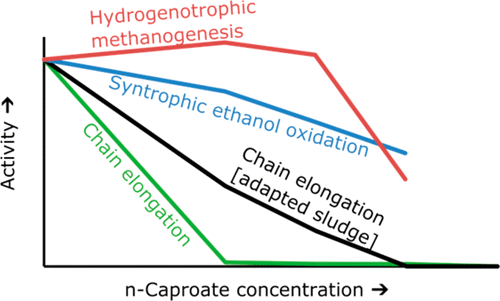当前位置:
X-MOL 学术
›
ACS Sustain. Chem. Eng.
›
论文详情
Our official English website, www.x-mol.net, welcomes your
feedback! (Note: you will need to create a separate account there.)
Effect of n-Caproate Concentration on Chain Elongation and Competing Processes.
ACS Sustainable Chemistry & Engineering ( IF 7.1 ) Pub Date : 2018-04-17 , DOI: 10.1021/acssuschemeng.8b00200 Mark Roghair 1 , Yuchen Liu 1 , Julius C Adiatma 1 , Ruud A Weusthuis 2 , Marieke E Bruins 3 , Cees J N Buisman 1 , David P B T B Strik 1
ACS Sustainable Chemistry & Engineering ( IF 7.1 ) Pub Date : 2018-04-17 , DOI: 10.1021/acssuschemeng.8b00200 Mark Roghair 1 , Yuchen Liu 1 , Julius C Adiatma 1 , Ruud A Weusthuis 2 , Marieke E Bruins 3 , Cees J N Buisman 1 , David P B T B Strik 1
Affiliation

|
Chain elongation is an open-culture fermentation process that facilitates conversion of organic residues with an additional electron donor, such as ethanol, into valuable n-caproate. Open-culture processes are catalyzed by an undefined consortium of microorganisms which typically also bring undesired (competing) processes. Inhibition of competing processes, such as syntrophic ethanol oxidation, will lead to a more selective n-caproate production process. In this study, we investigated the effect of n-caproate concentration on the specific activity of chain elongation and competing processes using batch inhibition assays. With "synthetic medium sludge" (originally operating at 3.4 g/L n-caproate), syntrophic ethanol oxidation was proportionally inhibited by n-caproate until 45% inhibition at 20 g/L n-caproate. Hydrogenotrophic methanogenesis was for 58% inhibited at 20 g/L n-caproate. Chain elongation of volatile fatty acids (volatile fatty acid upgrading; the desired process), was completely inhibited at 20 g/L n-caproate with all tested sludge types. "Adapted sludge" (operating at 23.2 g/L n-caproate) showed a 10 times higher volatile fatty acid upgrading activity at 15 g/L n-caproate compared to "nonadapted sludge" (operating at 7.1 g/L n-caproate). This shows that open cultures do adapt to perform chain elongation at high n-caproate concentrations which likely inhibits syntrophic ethanol oxidation through hydrogenotrophic methanogenesis. As such, we provide supporting evidence that the formation of n-caproate inhibits syntrophic ethanol oxidation which leads to a more selective medium chain fatty acid production process.
中文翻译:

正己酸酯浓度对链伸长和竞争过程的影响。
链延长是一种开放式发酵过程,可促进有机残基与其他电子供体(例如乙醇)转化为有价值的正己酸根。开放培养过程由不确定的微生物群落催化,这通常也会带来不希望的(竞争)过程。抑制竞争过程,例如共生乙醇氧化,将导致更具选择性的正己酸生产过程。在这项研究中,我们使用批次抑制试验研究了正己酸浓度对链延长和竞争过程的比活的影响。使用“合成培养基污泥”(最初在3.4 g / L正己酸下运行)时,正己酸按比例抑制同养乙醇氧化,直到在20 g / L正己酸下有45%的抑制作用。氢营养型甲烷生成在20 g / L正己酸中被抑制58%。对于所有测试的污泥类型,在20 g / L正己酸中,挥发性脂肪酸的链伸长(挥发性脂肪酸的提纯;所需的过程)被完全抑制。与“非适应性污泥”(以7.1 g / L正己酸操作)相比,“适应性污泥”(以23.2 g / L正己酸操作)显示的挥发性脂肪酸升级活性在15 g / L正己酸中要高10倍。 。这表明开放的培养物确实适合在高正己酸浓度下进行链延长,这很可能通过氢营养型甲烷生成而抑制营养型乙醇氧化。因此,我们提供了支持性证据,表明正己酸的形成会抑制同养乙醇氧化,从而导致更具选择性的中链脂肪酸生产过程。
更新日期:2018-04-17
中文翻译:

正己酸酯浓度对链伸长和竞争过程的影响。
链延长是一种开放式发酵过程,可促进有机残基与其他电子供体(例如乙醇)转化为有价值的正己酸根。开放培养过程由不确定的微生物群落催化,这通常也会带来不希望的(竞争)过程。抑制竞争过程,例如共生乙醇氧化,将导致更具选择性的正己酸生产过程。在这项研究中,我们使用批次抑制试验研究了正己酸浓度对链延长和竞争过程的比活的影响。使用“合成培养基污泥”(最初在3.4 g / L正己酸下运行)时,正己酸按比例抑制同养乙醇氧化,直到在20 g / L正己酸下有45%的抑制作用。氢营养型甲烷生成在20 g / L正己酸中被抑制58%。对于所有测试的污泥类型,在20 g / L正己酸中,挥发性脂肪酸的链伸长(挥发性脂肪酸的提纯;所需的过程)被完全抑制。与“非适应性污泥”(以7.1 g / L正己酸操作)相比,“适应性污泥”(以23.2 g / L正己酸操作)显示的挥发性脂肪酸升级活性在15 g / L正己酸中要高10倍。 。这表明开放的培养物确实适合在高正己酸浓度下进行链延长,这很可能通过氢营养型甲烷生成而抑制营养型乙醇氧化。因此,我们提供了支持性证据,表明正己酸的形成会抑制同养乙醇氧化,从而导致更具选择性的中链脂肪酸生产过程。











































 京公网安备 11010802027423号
京公网安备 11010802027423号